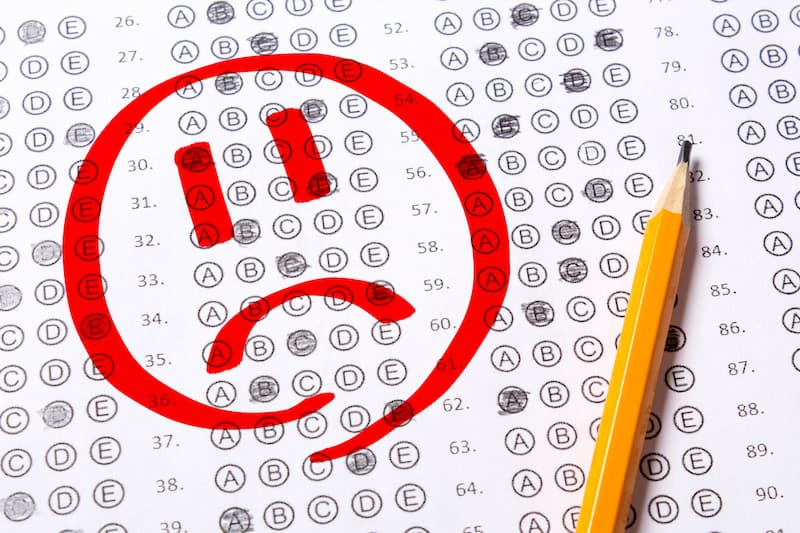Failing an exam can be a disheartening experience, but it doesn’t have to be the end of the road. If your child just had a bad GCSE result, we can help.
At Achieving Success, we know that with the right approach, guidance, and extra GCSE tuition, anyone can bounce back from a setback and pass that all-important re-sit exam. We’ll walk you through a step-by-step guide to help you understand what comes next, share proven strategies for success, and reveal how our private tutoring services can turn a re-sit exam into a triumphant learning experience.
Provide an Emotional Support for Your Child First
Failing your GCSE exams can be a devastating experience. The shock of the result, and the realisation that you might not achieve your dreams right away, can be overwhelming. Fortunately, we live in a world where mental health has become more critical than ever. Luckily, there are things you can do to help your child during this difficult time.
- Talk about their feelings openly and honestly. They will appreciate it if you show that you understand how they feel, and it will help them move on from their failure.
- Encourage them to try again! Nothing stops them from retaking their exams if they are motivated enough. And if they are not ready yet, don’t force them – give them time to grieve before encouraging them to start again.
- Tell them that you believe in them. Even if they don’t achieve their dreams immediately, there is always a chance they can still reach them.
Offering your child, the proper support will encourage them to give their exam another try. It will help them regain the confidence they may be lacking and persuade them to submit for a re-sit of their exam as early as possible to help them continue the path they already had in mind after their GCSEs.
Talk to School About Options
If your child fails a GCSE exam or does not quite get the results, they need to continue their educational plan, the options available can vary depending on the school. Some schools may still offer your child a place in the sixth form if it is just one exam they failed. These are often referred to as ‘special arrangements’ and allow students to re-sit this exam later, usually in the summer term.

However, if your child has failed more than one exam, the school may require them to re-sit them with the year below or find alternative tuition and return when they have achieved the necessary grades. They can continue their studies at their current school onto A-Level with the next year of students. It is also important that you speak with your child about what they want to do next so they can make an informed decision about their future education and career path.
How Many Times Can You Re-Sit a GCSE?
There is no limit to the number of times students can retake their GCSEs, nor an age limit for attempting them. However, it is important to achieve a minimum grade of four in compulsory subjects like maths and English, as these core subjects are what most educational settings require to offer a place in their programme.
If your child must re-sit most of their GCSEs, we recommend focusing on core subjects first plus any other subjects necessary for your child’s chosen subjects at A-Level or to access courses at college. Trying to retake all of them in one year can cause a lot of stress on students and could cause potential burnout, which could jeopardise their re-sits.
Create a Plan Revision Together
It is essential to create a plan together with your child. This could include working out how many hours they will need to study each day, which subjects require the most revision, and what tools or methods of learning are best suited to them. It can also help if you sit down and discuss any issues or concerns that they may have about retaking their exams.
- Create a study schedule. It is important that you work out how many hours your child needs to revise each day, which subjects require the most attention and what tools or methods of learning are best suited to them.

- Provide the optimum study environment. The study environment should be comfortable and stress-free. Choosing a quiet, private place where your child can focus on their revision is best. You should also ensure no distractions, such as TV or interruptions.
- Provide the right tools for revision. The tools you provide will depend on what subjects your child is revising for and how well they are doing with each one. For example, if they are struggling with maths, a calculator may be useful, but if they know how to do basic sums, it would be better to give them flashcards instead (which can be used in other subjects).
Planning revision techniques together can help your child stay on track and ensure they do not miss anything important. You can also help your child develop their revision techniques by asking what works for them and why.
Get the Right Tutor
When re-sitting a GCSE, getting additional help for your child is essential. It could be that their current teachers’ teaching style does not work efficiently for their needs and by seeking out a tutor to match your child’s needs, you will provide them the best chance to pass their GCSE re-sits.
At Achieving Success, we have a network of tutors in Birmingham that can help with all subjects. Whether it is English, Maths or Science, we can provide you with the best possible tutor for your child. We can also provide you with a range of services, including exam revision materials, extra help sessions and online tutoring. Our tutors have vast experience in the education world and will ensure that your child is given all the support they need to pass their GCSE re-sits. For information on our GCSE Holiday Workshops or any of our services to support your child, enquire online, and our team will be happy to help with any questions you may have.


